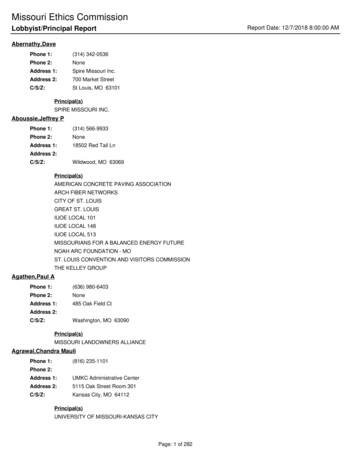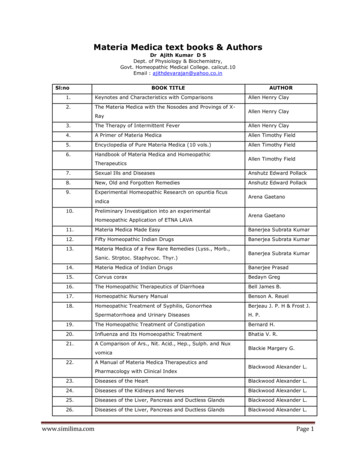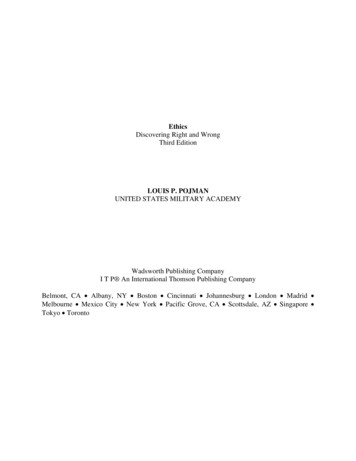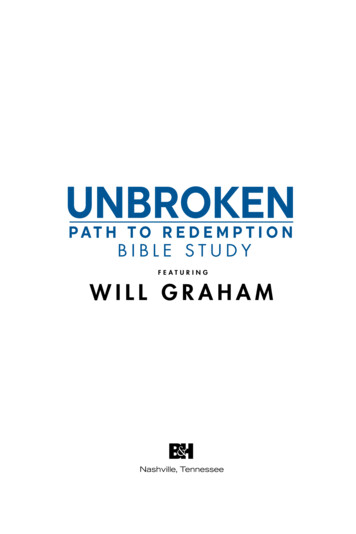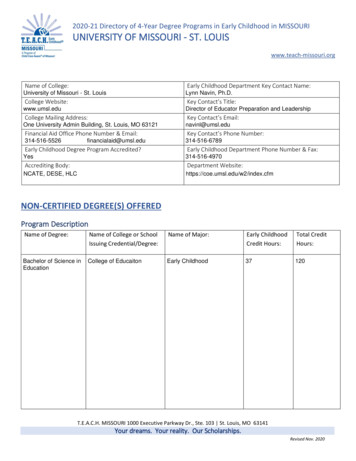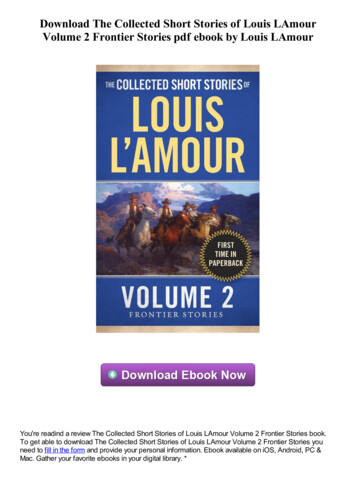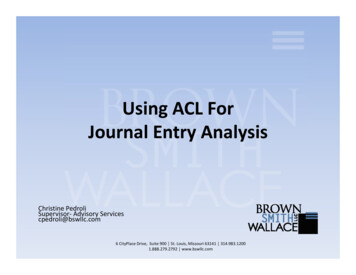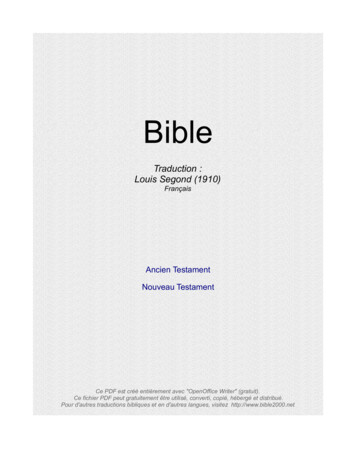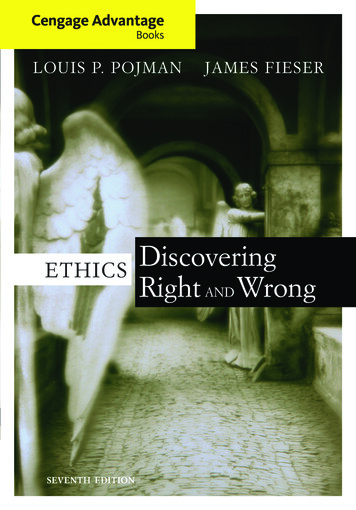
Transcription
Copyright 2011 Cengage Learning. All Rights Reserved. May not be copied, scanned, or duplicated, in whole or in part. Due to electronic rights, some third party content may be suppressed from the eBook and/or eChapter(s).Editorial review has deemed that any suppressed content does not materially affect the overall learning experience. Cengage Learning reserves the right to remove additional content at any time if subsequent rights restrictions require it. EthicsDiscovering Right and WrongSEVENTH EDITIONLate of the United States Military Academy, West PointLOUIS P. POJMANUniversity of Tennessee, MartinJAMES FIESERAustralia Brazil Japan Korea Mexico Singapore Spain United Kingdom United States
Copyright 2011 Cengage Learning. All Rights Reserved. May not be copied, scanned, or duplicated, in whole or in part. Due to electronic rights, some third party content may be suppressed from the eBook and/or eChapter(s).Editorial review has deemed that any suppressed content does not materially affect the overall learning experience. Cengage Learning reserves the right to remove additional content at any time if subsequent rights restrictions require it.
Copyright 2011 Cengage Learning. All Rights Reserved. May not be copied, scanned, or duplicated, in whole or in part. Due to electronic rights, some third party content may be suppressed from the eBook and/or eChapter(s).Editorial review has deemed that any suppressed content does not materially affect the overall learning experience. Cengage Learning reserves the right to remove additional content at any time if subsequent rights restrictions require it. EthicsDiscovering Right and WrongSEVENTH EDITIONLate of the United States Military Academy, West PointLOUIS P. POJMANUniversity of Tennessee, MartinJAMES FIESERAustralia Brazil Japan Korea Mexico Singapore Spain United Kingdom United States
Copyright 2011 Cengage Learning. All Rights Reserved. May not be copied, scanned, or duplicated, in whole or in part. Due to electronic rights, some third party content may be suppressed from the eBook and/or eChapter(s).Editorial review has deemed that any suppressed content does not materially affect the overall learning experience. Cengage Learning reserves the right to remove additional content at any time if subsequent rights restrictions require it.This is an electronic version of the print textbook. Due to electronic rights restrictions,some third party content may be suppressed. Editorial review has deemed that any suppressedcontent does not materially affect the overall learning experience. The publisher reserves the rightto remove content from this title at any time if subsequent rights restrictions require it. Forvaluable information on pricing, previous editions, changes to current editions, and alternateformats, please visit www.cengage.com/highered to search by ISBN#, author, title, or keyword formaterials in your areas of interest.
Copyright 2011 Cengage Learning. All Rights Reserved. May not be copied, scanned, or duplicated, in whole or in part. Due to electronic rights, some third party content may be suppressed from the eBook and/or eChapter(s).Editorial review has deemed that any suppressed content does not materially affect the overall learning experience. Cengage Learning reserves the right to remove additional content at any time if subsequent rights restrictions require it.Ethics: Discovering Right andWrong, Seventh EditionLouis P. Pojman and James FieserExecutive Editor: Clark BaxterSenior Sponsoring Editor: JoannKozyrevDevelopment Editor: Ian LagueAssistant Editor: Joshua DuncanEditorial Assistant: Marri StratonMedia Editor: Kimberly ApfelbaumMarketing Manager: Mark T.HaynesMarketing Coordinator: JoshHendrickMarketing CommunicationsManager: Laura LocalioContent Project Management:PreMediaGlobalSenior Art Director: Jennifer Wahi 2012, 2009, 2006 Wadsworth, Cengage LearningALL RIGHTS RESERVED. No part of this work covered by thecopyright herein may be reproduced, transmitted, stored, or usedin any form or by any means graphic, electronic, or mechanical,including but not limited to photocopying, recording, scanning,digitizing, taping, Web distribution, information networks, orinformation storage and retrieval systems, except as permittedunder Section 107 or 108 of the 1976 United States Copyright Act,without the prior written permission of the publisher.For product information andtechnology assistance, contact us at Cengage LearningCustomer & Sales Support, 1-800-354-9706For permission to use material from this text or product,submit all requests online at www.cengage.com/permissions.Further permissions questions can be emailed topermissionrequest@cengage.com.Library of Congress Control Number: 2010942667ISBN-13: 978-1-111-29817-3ISBN-10: 1-111-29817-3Print Buyer: Karen HuntRights Acquisition Specialist,Image: Amanda GroszkoSenior Rights AcquisitionSpecialist, Text: Katie HuhaProduction Service:PreMediaGlobalCover Designer: Kate ScheibleCover Image: Getty ImagesCompositor: PreMediaGlobalWadsworth20 Channel Center StreetBoston, MA 02210USACengage Learning is a leading provider of customized learningsolutions with office locations around the globe, includingSingapore, the United Kingdom, Australia, Mexico, Braziland Japan. Locate your local office atinternational.cengage.com/region.Cengage Learning products are represented in Canada byNelson Education, Ltd.For your course and learning solutions, visit www.cengage.com.Purchase any of our products at your local college store or at ourpreferred online store www.cengagebrain.com.Instructors: Please visit login.cengage.com and log in to accessinstructor-specific resources.Printed in the United States of America1 2 3 4 5 6 7 15 14 13 12 11
Copyright 2011 Cengage Learning. All Rights Reserved. May not be copied, scanned, or duplicated, in whole or in part. Due to electronic rights, some third party content may be suppressed from the eBook and/or eChapter(s).Editorial review has deemed that any suppressed content does not materially affect the overall learning experience. Cengage Learning reserves the right to remove additional content at any time if subsequent rights restrictions require it. About the AuthorsLouis P. Pojman (1935–2005) was professor of Philosophy, Emeritus, at theUnited States Military Academy and a Life Member of Clare Hall, CambridgeUniversity. He received an M.A. and a Ph.D. from Union Theological Seminary/Columbia University and a D. Phil. from Oxford University. He wrote inthe areas of philosophy of religion, epistemology, ethics, and political philosophyand is the author or editor of more than 30 books and 100 articles. Among theseare Ethics: Discovering Right and Wrong (6/e 2010), Environmental Ethics (5/e 2008),Who Are We? (2005), and Global Political Philosophy (2003).James Fieser is professor of Philosophy at the University of Tennessee at Martin.He received his B.A. from Berea College, and his M.A. and Ph.D. in philosophyfrom Purdue University. He is author, coauthor or editor of ten text books,including Socrates to Sartre and Beyond (9/e 2011), Ethical Theory: Classical and Contemporary Readings (6/e 2010), A Historical Introduction to Philosophy (2003), andMoral Philosophy through the Ages (2001). He has edited and annotated the tenvolume Early Responses to Hume (2/e 2005) and the five-volume Scottish CommonSense Philosophy (2000). He is founder and general editor of the Internet Encyclopediaof Philosophy Website (www.iep.utm.edu).v
Copyright 2011 Cengage Learning. All Rights Reserved. May not be copied, scanned, or duplicated, in whole or in part. Due to electronic rights, some third party content may be suppressed from the eBook and/or eChapter(s).Editorial review has deemed that any suppressed content does not materially affect the overall learning experience. Cengage Learning reserves the right to remove additional content at any time if subsequent rights restrictions require it.
Copyright 2011 Cengage Learning. All Rights Reserved. May not be copied, scanned, or duplicated, in whole or in part. Due to electronic rights, some third party content may be suppressed from the eBook and/or eChapter(s).Editorial review has deemed that any suppressed content does not materially affect the overall learning experience. Cengage Learning reserves the right to remove additional content at any time if subsequent rights restrictions require it. ContentsPREFACE1xiWhat Is Ethics?1Ethics and Its Subdivisions 2Morality as Compared with Other Normative SubjectsTraits of Moral Principles 7Domains of Ethical AssessmentConclusion 11For Further Reflection2812For Further Reading13Ethical Relativism14Subjective Ethical Relativism16Conventional Ethical Relativism 18Criticisms of Conventional Ethical RelativismConclusion 27For Further Reflection328For Further Reading29Moral Objectivism30Aquinas’s Objectivism and AbsolutismModerate Objectivism 38Ethical SituationalismConclusion4344vii32213
Copyright 2011 Cengage Learning. All Rights Reserved. May not be copied, scanned, or duplicated, in whole or in part. Due to electronic rights, some third party content may be suppressed from the eBook and/or eChapter(s).Editorial review has deemed that any suppressed content does not materially affect the overall learning experience. Cengage Learning reserves the right to remove additional content at any time if subsequent rights restrictions require it.viiiCONTENTSFor Further ReflectionFor Further Reading44545Value and the Quest for the GoodIntrinsic and Instrumental ValueThe Value of Pleasure 504647Are Values Objective or Subjective? 53The Relation of Value to Morality 54The Good Life57Conclusion 61For Further ReflectionFor Further Reading56262Social Contract Theory and the Motive to Be MoralWhy Does Society Need Moral Rules?Why Should I Be Moral? 70Morality, Self-Interest, and Game TheoryThe Motive to Always Be Moral 75Conclusion667278For Further Reflection 79For Further Reading 796Egoism, Self-Interest, and AltruismPsychological Egoism82Ethical Egoism 87Arguments against Ethical EgoismEvolution and AltruismConclusion 9795For Further Reflection98For Further Reading7819199Utilitarianism 100Classic Utilitarianism 102Act- and Rule-Utilitarianism105Criticism of Utilitarianism 109Criticism of the Ends Justifying Immoral MeansConclusion 118For Further ReflectionFor Further Reading11911911464
ixCopyright 2011 Cengage Learning. All Rights Reserved. May not be copied, scanned, or duplicated, in whole or in part. Due to electronic rights, some third party content may be suppressed from the eBook and/or eChapter(s).Editorial review has deemed that any suppressed content does not materially affect the overall learning experience. Cengage Learning reserves the right to remove additional content at any time if subsequent rights restrictions require it.CONTENTS8Kant and Deontological TheoriesKant’s Influences 122The Categorical Imperative121126Counterexamples to the Principle of the Law of NatureOther Formulations of the Categorical ImperativeThe Problem of Exceptionless Rules 138The Problem of Posterity 141Conclusion: A Reconciliation Project132135143For Further Reflection 144For Further Reading 1459Virtue Theory 146The Nature of Virtue Ethics147Criticisms of Action-Based Ethics 151Connections between Virtue-Basedand Action-Based Ethics 157Conclusion 165For Further ReflectionFor Further Reading10 Gender and Ethics166166167Classic Views 169Female Care Ethics 174Four Options Regarding Gender and EthicsConclusion 183For Further ReflectionFor Further Reading11 Religion and Ethics179185186187Does Morality Depend on Religion? 188Is Religion Irrelevant or Even Contrary to Morality?Does Religion Enhance the Moral Life?Conclusion 203193198For Further Reflection 204For Further Reading 20512 The Fact–Value Problem 206Hume and Moore: The Problem Classically StatedAyer and Emotivism210207
Copyright 2011 Cengage Learning. All Rights Reserved. May not be copied, scanned, or duplicated, in whole or in part. Due to electronic rights, some third party content may be suppressed from the eBook and/or eChapter(s).Editorial review has deemed that any suppressed content does not materially affect the overall learning experience. Cengage Learning reserves the right to remove additional content at any time if subsequent rights restrictions require it.xCONTENTSHare and Prescriptivism214Naturalism and the Fact–Value ProblemConclusion 224For Further ReflectionFor Further Reading22122522613 Moral Realism and the Challenge of SkepticismMackie’s Moral Skepticism 229Harman’s Moral Nihilism227233A Defense of Moral RealismConclusion 240237For Further Reflection 241For Further Reading 242APPENDIX243GLOSSARY247INDEX251For more information on an alternate version of this book which contains classicand contemporary philosophical reading selections in the back of the book, pleasecontact your Cengage Learning representative.
Copyright 2011 Cengage Learning. All Rights Reserved. May not be copied, scanned, or duplicated, in whole or in part. Due to electronic rights, some third party content may be suppressed from the eBook and/or eChapter(s).Editorial review has deemed that any suppressed content does not materially affect the overall learning experience. Cengage Learning reserves the right to remove additional content at any time if subsequent rights restrictions require it. PrefaceIn 1977, Australian philosopher John L. Mackie published his famous bookEthics: Inventing Right and Wrong, in which he argues that the moral valueswe hold are inventions of society: “we have to decide what moral viewsto adopt, what moral stands to take.” The title of the present book, Ethics:Discovering Right and Wrong, is both an acknowledgement of the importance ofMackie’s view and a response to it.Morality is not purely an invention, as Mackie suggests, but it also involvesa discovery. We may compare morality to the development of the wheel. Bothare creations based on discoverable features. The wheel was invented to facilitate the transportation of objects with minimal friction. The construction of awheel adheres to the laws of physics to bring about efficient motion. Not just anything could function as a good wheel. A rectangular or triangular wheel would beinefficient, as would one made out of sand or bird feathers or heavy stones. Analogously, morality has been constructed to serve human needs and desires, forexample, the need to survive and the desires to prosper and be happy. The idealmorality should serve as the blueprint for individual happiness and social harmony.Human beings have used their best minds over millennia to discover those principles that best serve to promote individual and social well-being. Just as the construction of the wheel is dependent on the laws of physics, so the construction ofmorality has been dependent on human nature, on discoverable features of ourbeing. It is in this spirit of moral discovery that Ethics: Discovering Right and Wrongsurveys the main theories of moral philosophy today.The philosophical community experienced a great loss in 2005 with thedeath of Louis Pojman, the original author of this book, who succumbed to hisbattle with cancer. His voluminous writings—over 30 books and 100 articles—have been uniformly praised for their high level of scholarship and insight, andcountless philosophy students and teachers have benefited from them (see www.louispojman.com for biographical and bibliographical details).xi
Copyright 2011 Cengage Learning. All Rights Reserved. May not be copied, scanned, or duplicated, in whole or in part. Due to electronic rights, some third party content may be suppressed from the eBook and/or eChapter(s).Editorial review has deemed that any suppressed content does not materially affect the overall learning experience. Cengage Learning reserves the right to remove additional content at any time if subsequent rights restrictions require it.xiiPREFACEEthics: Discovering Right and Wrong was first published in 1990 and quicklyestablished itself as an authoritative, yet reader-friendly, introduction to ethics.In an earlier preface, Louis expresses his enthusiasm for his subject and his commitment to his reader:I have written this book in the spirit of a quest for truth and understanding, hoping to excite you about the value of ethics. It is a subjectthat I love, for it is about how we are to live, about the best kind of life.I hope that you will come to share my enthusiasm for the subject anddevelop your own ideas in the process.Over the years, new editions of this book have appeared in response to the continually evolving needs of college instructors and students. Throughout thesechanges, however, the book has focused on the central issues of ethical theory,which in this edition include chapters on the following 12 subjects, beginningwith the more theoretical issues of (1) what ethics is most generally, (2) ethicalrelativism, (3) moral objectivism, (4) moral value, (5) social contract theory andthe motive to be moral, and (6) egoism and altruism. The book next focuses onthe influential normative theories of (7) utilitiarianism, (8) Kantianism and deontology, and (9) virtue theory. Building on these concepts, the last portion of thebook explores the more contemporary theoretical debates surrounding (10) gender and ethics, (11) religion and ethics, (12) the fact/value problem, and(13) moral realism and skepticism.This newly revised seventh edition attempts to reflect the spirit of changethat governed previous editions. As with most text book revisions, the inclusionof new material in this edition required the deletion of a comparable amount ofpreviously existing material. Many of the changes in this edition were suggestedby previous book users, both faculty and students, for which I am very grateful.The most noticeable changes are these: A new chapter on gender and ethicsA discussion of Christine Korsgaard in the chapter on KantA discussion of Richard Dawkins in the chapter on religion and ethicsOther minor changes have been made throughout.ACKNOWLEDGEMENTSThe preface to the fifth edition of this book lists the following acknowledgements, which I present here verbatim:Michael Beaty, Sterling Harwood, Stephen Kershnar, Bill Lawhead,Michael Levin, Robert Louden, Laura Purdy, Roger Rigterink, BruceRussell, Walter Schaller, Bob Westmoreland, and Mark Discher werevery helpful in offering trenchant criticisms on several chapters of thisbook. The students in my ethical theory classes at the University of
Copyright 2011 Cengage Learning. All Rights Reserved. May not be copied, scanned, or duplicated, in whole or in part. Due to electronic rights, some third party content may be suppressed from the eBook and/or eChapter(s).Editorial review has deemed that any suppressed content does not materially affect the overall learning experience. Cengage Learning reserves the right to remove additional content at any time if subsequent rights restrictions require it.PREFACExiiiMississippi and the U.S. Military Academy at West Point for the pasttwenty years have served as a challenging sounding board for many ofmy arguments. Ronald F. Duska, Rosemont College; Stephen Griffith,Lycoming College; Arthur Kuflik, University of Vermont; James Lindemann Nelson, Michigan State University; Peter List, Oregon StateUniversity; Ann A. Pang-White, University of Scranton; Fred Schueler,University of New Mexico; Nancy A. Stanlick, University of CentralFlorida; R. Duane Thompson, Indiana Wesleyan University; PeterVallentyne, Virginia Commonwealth University; and David A. White,Marquette University reviewed the manuscript for an earlier edition andprovided guidance in revising this latest edition.I thank Joann Kozyrev, Ian Lague, and the rest of the talented editorial staff atCengage for their expertise and good nature throughout the production of thisnew edition. Thanks also to the dozens of ethics instructors who completed anonline survey about the text and made valuable suggestions for improvement.Finally, I thank Louis’s wife, Trudy Pojman, for her gracious encouragementwith this project.James FieserAugust 1, 2010
Copyright 2011 Cengage Learning. All Rights Reserved. May not be copied, scanned, or duplicated, in whole or in part. Due to electronic rights, some third party content may be suppressed from the eBook and/or eChapter(s).Editorial review has deemed that any suppressed content does not materially affect the overall learning experience. Cengage Learning reserves the right to remove additional content at any time if subsequent rights restrictions require it.
Copyright 2011 Cengage Learning. All Rights Reserved. May not be copied, scanned, or duplicated, in whole or in part. Due to electronic rights, some third party content may be suppressed from the eBook and/or eChapter(s).Editorial review has deemed that any suppressed content does not materially affect the overall learning experience. Cengage Learning reserves the right to remove additional content at any time if subsequent rights restrictions require it.1 What Is Ethics?In all the world and in all of life there is nothing more important todetermine than what is right. Whatever the matter which lies before uscalling for consideration, whatever the question asked us or the problemto be solved, there is some settlement of it which will meet the situationand is to be sought . . . . Wherever there is a decision to be made or anydeliberation is in point, there is a right determination of the matter inhand which is to be found and adhered to, and other possiblecommitments which would be wrong and are to be avoided.C. I. LEWIS, THE GROUND AND NATURE OF RIGHTWe are discussing no small matter, but how we ought to live.SOCRATES, IN PLATO’S REPUBLICSome years ago, the nation was stunned by a report from New York City.A young woman, Kitty Genovese, was brutally stabbed in her own neighborhood late at night during three separate attacks while thirty-eight respectable,law-abiding citizens watched or listened. During the thirty-five minute struggle,her assailant beat her, stabbed her, left her, and then returned to attack her twomore times until she died. No one lifted a phone to call the police; no oneshouted at the criminal, let alone went to Genovese’s aid. Finally, a seventyyear-old woman called the police. It took them just two minutes to arrive, butby that time Genovese was already dead.Only one other woman came out to testify before the ambulance showed upan hour later. Then residents from the whole neighborhood poured out of theirapartments. When asked why they hadn’t done anything, they gave answers ranging from “I don’t know” and “I was tired” to “Frankly, we were afraid.”11
Copyright 2011 Cengage Learning. All Rights Reserved. May not be copied, scanned, or duplicated, in whole or in part. Due to electronic rights, some third party content may be suppressed from the eBook and/or eChapter(s).Editorial review has deemed that any suppressed content does not materially affect the overall learning experience. Cengage Learning reserves the right to remove additional content at any time if subsequent rights restrictions require it.2CHAPTER1This tragic event raises many questions about our moral responsibility to others.What should these respectable citizens have done? Are such acts of omission morallyblameworthy? Is the Genovese murder an atypical situation, or does it represent adisturbing trend? This story also raises important questions about the general notionof morality. What is the nature of morality, and why do we need it? What is theGood, and how will we know it? Is it in our interest to be moral? What is the relationship between morality and religion? What is the relationship between moralityand law? What is the relationship between morality and etiquette? These are someof the questions that we explore in this book. We want to understand the foundation and structure of morality. We want to know how we should live.ETHICS AND ITS SUBDIVISIONSEthics is that branch of philosophy that deals with how we ought to live, with theidea of the Good, and with concepts such as “right” and “wrong.” But what is philosophy? It is an enterprise that begins with wonder at the marvels and mysteries ofthe world; that pursues a rational investigation of those marvels and mysteries, seeking wisdom and truth; and that results in a life lived in passionate moral and intellectual integrity. Taking as its motto Socrates’ famous statement that “the unexaminedlife is not worth living,” philosophy leaves no aspect of life untouched by its inquiry.It aims at a clear, critical, comprehensive conception of reality.The main characteristic of philosophy is rational argument. Philosophersclarify concepts and analyze and test propositions and beliefs, but their majortask is to analyze and construct arguments. Philosophical reasoning is closelyallied with scientific reasoning, in that both build hypotheses and look for evidence to test those hypotheses with the hope of coming closer to the truth.However, scientific experiments take place in laboratories and have testing procedures through which to record objective or empirically verifiable results. Thelaboratory of the philosopher is the domain of ideas. It takes place in the mind,where imaginative thought experiments occur. It takes place in the study room,where ideas are written down and examined. It also takes place wherever conversation or debate about the perennial questions arises, where thesis and counterexample and counterthesis are considered.The study of ethics within philosophy contains its own subdivisions, anddividing up the territory of ethics is a tricky matter. A word must be said firstabout the specific terms moral and ethical and the associated notions of morals/ethicsand morality/ethicality. Often these terms are used interchangeably—as will be thecase in this book. Both terms derive their meaning from the idea of “custom”—that is, normal behavior. Specifically, “moral” comes from the Latin word moresand “ethical” from the Greek ethos.The key divisions within the study of ethics are (1) descriptive morality,(2) moral philosophy (ethical theory), and (3) applied ethics. First, descriptivemorality refers to actual beliefs, customs, principles, and practices of people
Copyright 2011 Cengage Learning. All Rights Reserved. May not be copied, scanned, or duplicated, in whole or in part. Due to electronic rights, some third party content may be suppressed from the eBook and/or eChapter(s).Editorial review has deemed that any suppressed content does not materially affect the overall learning experience. Cengage Learning reserves the right to remove additional content at any time if subsequent rights restrictions require it.WHAT IS ETHICS?3and cultures. Sociologists in particular pay special attention to the concrete moralpractices of social groups around the world, and they view them as cultural“facts,” much like facts about what people in those countries eat or how theydress. Second, moral philosophy—also called ethical theory—refers to thesystematic effort to understand moral concepts and justify moral principles andtheories. It analyzes key ethical concepts such as “right,” “wrong,” and“permissible.” It explores possible sources of moral obligation such as God,human reason, or the desire to be happy. It seeks to establish principles of rightbehavior that may serve as action guides for individuals and groups. Third,applied ethics deals with controversial moral problems such as abortion, premarital sex, capital punishment, euthanasia, and civil disobedience.The larger study of ethics, then, draws on all three of these subdivisions,connecting them in important ways. For example, moral philosophy is verymuch interrelated with applied ethics: Theory without application is sterile anduseless, but action without a theoretical perspective is blind. There will be anenormous difference in the quality of debates about abortion, for example,when those discussions are informed by ethical theory as compared to whenthey are not. More light and less heat will be the likely outcome. With theonset of multiculturalism and the deep differences in worldviews around theglobe today, the need to use reason, rather than violence, to settle our disputesand resolve conflicts of interest has become obvious. Ethical awareness is thenecessary condition for human survival and flourishing.If we are to endure as a free, civilized people, we must take ethics moreseriously than we have before. Ethical theory may rid us of simplistic extremismand emotionalism—where shouting matches replace arguments. Ethical theoryclarifies relevant concepts, constructs and evaluates arguments, and guides us onhow to live our lives. It is important that the educated person be able to discussethical situations with precision and subtlety.The study of ethics is not only of instrumental value but also valuable in itsown right. It is satisfying to have knowledge of important matters for its ownsake, and it is important to understand the nature and scope of moral theoryfor its own sake. We are rational beings who cannot help but want to understandthe nature of the good life and all that it implies. The study of ethics is sometimes a bit off-putting because so many differing theories often appear to contradict each other and thus produce confusion rather than guidance. But anappreciation of the complexity of ethics is valuable in offsetting our natural tendency toward inflexibility and tribalism where we stubbornly adhere to thevalues of our specific peer groups.MORALITY AS COMPARED WITH OTHERNORMATIVE SUBJECTSMoral principles concern standards of behavior; roughly speaking, they involvenot what is but what ought to be. How should I live my life? What is the rightthing to do in this situation? Is premarital sex morally permiss
the areas of philosophy of religion, epistemology, ethics, and political philosophy and is the author or editor of more than 30 books and 100 articles. Among these are Ethics: Discovering Right and Wrong (6/e 2010), Environmental Ethics (5/e 2008), Wh
